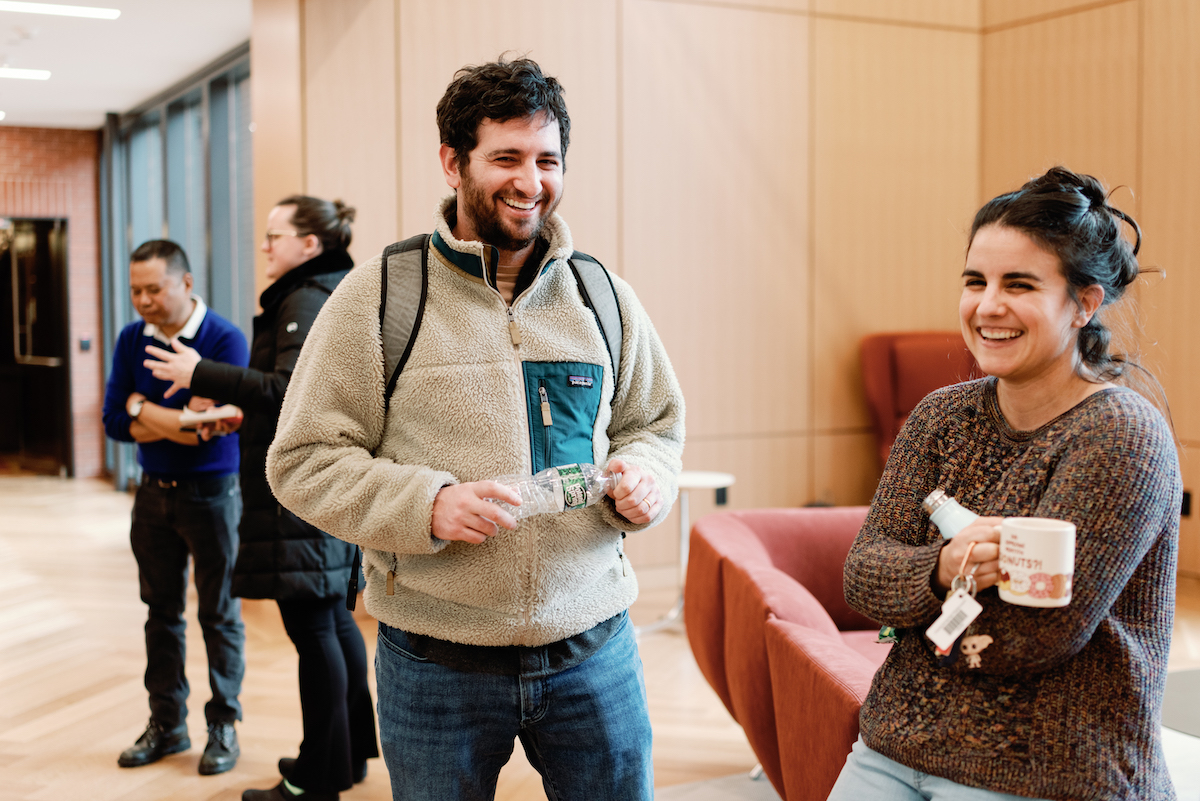Looking Back on the 2023 Kuznets Mini-Conference, “Norms, Gender, and Development”
Michela Carlana and Zahrah Abdulrauf describe the event co-organized by Eliana La Ferrara – following her delivery of the 32nd Annual Kuznets lecture – and Carlana at Yale University. Held on March 3, 2023, the Kuznets Mini-conference featured new research by early-career researchers on the determinants of social norms and their economic effects.

Tackling negative social norms to enhance economic development
By Michela Carlana and Zahrah Abdulrauf
March 16, 2023
Over 200 million women worldwide experience female genital cutting – and this practice persists in many countries despite the high health costs and legislation against it. Why do harmful norms persist? Should we expect that harmful norms will naturally evolve and disappear, or is targeted policy intervention necessary for lasting change?
These were a few of the questions raised by Eliana La Ferrara’s lecture that opened the 2023 Kuznets programming hosted by the Yale Economic Growth Center. A mini-conference on the day following the lecture explored a wide range of gender norms, their economic effects, and interventions that may alter them to the benefit of both individuals and economies.
The one-day mini conference consisted of three parts:
- Labor market: How do norms interact with the labor market?
- Social norms: How do norms interact with identity, social trust, and public opinion?
- Children and education: How do norms influence child development and education?

A lunchtime panel on research on social norms featured (left-to-right) Rohini Pande (Yale University), Leonard Wantchekon (Princeton University), Martina Björkman Nyqvist (Stockholm School of Economics), and Eliana La Ferrara (Harvard University).
The Impact of Gender Norms on the Labor Market
Can institutions enable female labor force participation by mitigating the impact of harmful gender norms? How has the behavior of women changed in response to new economic opportunities incentivizing them to work outside of the home? And how are employer preferences changing as a result of these shifts?
The first session of the mini-conference began with studies considering the impact of social norms on the behavior and participation of women in the labor market.
Alexia Delfino presented a model of entrepreneurship that predicts that female businesses will interact with men only when external authorities enforce contracts fairly, and when social norms empower female bargaining. The study finds that the enforcement of contracts can be an effective way to increase trust and encourage women's participation in the market, resulting in economic benefits for both men and women.
- “Female Entrepreneurship and Trust in the Market”
- Authors: Nava Ashraf, Alexia Delfino, Edward Glaeser
- Speaker: Alexia Delfino (Bocconi University)
Our project suggests that improvements in contract enforcement may enable productive female entrepreneurship and inter-gender collaboration. But our results can extend into any other area of economic collaboration where contracts are incomplete and property or decision rights are limited. Our plan is to explore scientific partnerships and co-authorships next.
– Alexia Delfino
Assistant Professor in the Department of Economics at Bocconi University
Naila Shofia delved into the complex relationships between economic opportunities, domestic roles, and religious practices in Indonesia. Using around a quarter million photographs from Indonesia’s public high school yearbooks from 1995 to 2015, Shofia finds that new economic opportunities that require women to abandon their domestic roles have driven the adoption of religious veiling as a signaling device. Shofia concludes that by wearing the veil in public, Indonesian women seek to distance themselves from the stigma associated with working outside of the home.
- “Why Veil? Religious Headscarves and the Public Role of Women”
- Author: Naila Shofia
- Speaker: Naila Shofia (National University of Singapore)
Stefano Fiorin further explored the interactions between gender norms, religious veiling, and the Indonesian labor market. He described research evaluating how veiling is perceived by employers. Fiorin finds that applications of veiled women are rated systematically lower by employers and are less likely to receive an interview. This suggests women’s choice to wear a veil might make it more difficult to find a job because of reasons related to their social environment.
- “Labor Markets Matching in Indonesia: Estimating Employers’ Preferences with Incentivized Resume Rating”
- Authors: Stefano Fiorin, Eliana La Ferrara, Naila Shofia
- Speaker: Stefano Fiorin (Bocconi University)
Having documented significant and widespread discrimination in Indonesian labor markets against female job-applicants wearing a religious headscarf, a remaining open question is why veiling is increasing regardless of these negative labor market returns. We plan to explore the possible presence of “social returns” to veiling. First, we will document whether society generally disapproves women working outside their home. Second, we will test whether veiling allows women to take these jobs while maintaining their social reputation.
– Stefano Fiorin
Assistant Professor in the Department of Economics at Bocconi University

Eliana La Ferrara asks a question at the 2023 Kuznets Mini-conference.
The Relationship Between Norms, Identity, and Social Trust
Research featured in the second session investigated how societal norms interact with culture, social trust, and public opinion. These works highlight how social norms are linked to identity, and how this impacts social cohesion.
The practice of female genital cutting (FGC) harms girls both at time of cutting and later in life. But because certain aspects of the ritual hold cultural significance, government and NGO efforts pushing for the outright abandonment of FGC are often ineffective and sometimes lead to backlash. Lucia Corno presented the results of an RCT that tested two alternative approaches to reduce FGC: an informational campaign exposing the negative effects of female genital cutting, and a modified ritual designed to preserve the symbolic value of the practices surrounding FGC without the physical cut. She finds that both interventions increase the probability that girls between the ages of 7 and 15 were uncut by up to 14 percent three years later.
- “Norms Replacement. A Field Experiment on Ending Female Genital Cutting”
- Authors: Lucia Corno, Eliana La Ferrara
- Speaker: Lucia Corno (Cattolica University)
Our project suggest the viability of bottom up approaches in which communities are asked to reflect on the costs of FGC and to find alternative rituals that preserve the cultural identity component without putting girls’ health at risk. Future research should investigate whether a similar approach is viable to reduce other harmful practices widespread in developing countries, such as breast-ironing, and whether it might help governments in their effort to reduce FGC.
– Lucia Corno
Associate Professor in the Department of Economics and Finance at Cattolica University
Giulia Caprini presented work on media in the United States, and whether banner headline images influence public opinion in a partisan way. She used a natural language processing framework to evaluate the partisanship of pictures used by major media outlets, and a survey experiment to test the effect of visual partisanship on reader opinions. Her results show that differing visual narratives advanced by Republican and Democratic-leaning media significantly alter reader opinion and increase polarization.
- “Visual Bias”
- Authors: Giulia Caprini
- Speaker: Giulia Caprini (Oxford University)
Salma Mousa described work with a coauthor using randomized interactions in seven countries around the world, where pedestrians encountered three different experimental situations related to trust: a stranger dropping groceries, asking for directions, and asking to borrow a cell phone. The authors also varied the gender, ethnicity, and socio-economic status of the person asking for help. They find that in every country and experiment, gender is the strongest determinant of both trust and trustworthiness, and that women are much less likely to trust strangers – even other women – relative to men.
- “Gender & Social (Dis)Trust: Results from a Global Field Experiment”
- Authors: Saad Gulzar, Salma Mousa
- Speaker: Salma Mousa (Yale University)

Conference presenters and attendees during a break at the 2022 Kuznets Mini-conference.
Norms, Child Development, and Education
The papers in the third session highlight the impact of social norms on the development of children within the home and at school, spanning teacher biases, gender-based violence, childcare, and fertility practices.
Selim Gulesci presented work with co-authors on how information can prevent gender-based violence (GBV) in schools. The team designed and implemented an intervention delivering a pre-existing curriculum on GBV through specially trained teachers in 326 schools to over 9,000 children. They find this leads to a reduction of violence among boys (even when the intervention targets girls), a reduction of sexual violence by teachers towards girls, and an increase in enrollment rates for both girls and boys eight to 12 months after the program.
- “Gender Based Violence and Education: Evidence from Mozambique”
- Authors: Sofia Amaral, Aixa Garcia-Ramos, Selim Gulesci, Sarita Ore, Alejandra Ramos, Maria Micaela Sviatschi
- Speaker: Selim Gulesci (Trinity College Dublin)
School-based violence is prevalent in Mozambique, as in many other Sub-Saharan African countries, and can be an explaining factor for high levels of school drop-out rates among adolescents. In this project, we are exploring whether a school-based intervention targeting gender-based violence can help reduce violence experienced by adolescent girls and boys and increase school retention. If the intervention is successful (and our preliminary findings suggest so) we will explore the possibility of implementing it at the national level.
– Selim Gulesci
Associate Professor of Economics at Trinity College Dublin
Public education offers a unique opportunity to enhance upward mobility if socio-economic inequalities are not perpetuated within schools through segregation and biased behavior. Michela Carlana presented a paper showing that teachers’ school track recommendations in Italy were biased against low socio-economic status students, when grades and interests were held constant. The paper gives preliminary evidence that administrative data may provide a promising avenue to enhance equal opportunities in schools by sharing with teachers the socio-economic status gaps of their track recommendations.
- “Some are More Equal than Others: School Tracking and Teachers’ Recommendation”
- Authors: Michela Carlana, Francesca Miserocchi, Eleonora Patacchini
- Speaker: Michela Carlana (Harvard Kennedy School)
Guilhem Cassan presented work on sex-selective abortions, instrumental births, and the “stopping rule.” The stopping rule refers to behavior where parents continue having children until they reach a specific number of children of a given gender (boys, in general). Cassan and co-authors find that prohibiting sex-selective abortions may lead to an increase in instrumental births, and that prohibiting instrumental births may lead to an increase in sex-selective abortions. The authors conclude that instrumental births and sex-selective abortions need to be studied jointly to avoid the risk of overlooking policy tradeoffs.

Guilhem Cassan presenting at the 2023 Kuznets Mini-conference.
Lore Vandewalle described research with coauthors evaluating the cost-effectiveness and household effects of subsidizing childcare in low-income contexts. The team designed an intervention to randomly offer mothers of three-to-five-year-old children in Uganda a childcare subsidy or an equivalent cash grant. Their results show that childcare leads to a 44 percent increase in household income, which is at least as large as the impact of cash.
- “Childcare, Labor Supply, and Business Development: Experimental Evidence from Uganda”
- Authors: Kjetil Bjorvatn, Denise Ferris, Selim Gulesci, Arne Nasgowitz, Vincent Somville, Lore Vandewalle
- Speaker: Lore Vandewalle (Geneva Graduate Institute)
Access to childcare has been critical for increasing women’s labor force participation in many high-income countries. This does not necessarily carry through to low-income contexts, due to additional barriers to women’s employment outside the home. To successfully employ childcare as a means to increase female labor force participation, joint binding constraints, such as gender norms, should be considered.
– Lore Vandewalle
Associate Professor of Economics at the Graduate Institute of International and Development Studies

Lore Vandewalle presenting at the 2023 Kuznets Mini-conference.
My research discussed at the mini-conference focused on improving gender inequalities within the household by implementing and evaluating the impacts of a communication training program for mothers on child health in Uganda. The hypothesis is that the training will enable women better to convey their knowledge and preferences to their husbands, thereby boosting investments in children’s health. This fits within the field of social and gender norms in low-income countries and how to enhance the current inequalities in mothers' and fathers' decision-making and power structures.
– Martina Björkman Nyqvist
Carl Bennet & Marianne and Marcus Wallenberg Professor in Economics at the Stockholm School of Economics
Eliana La Ferrara, Martina Björkman Nyqvist, Rohini Pande, and Leonard Wantchekon participated in a panel discussion on the role of informal and formal institutions in changing harmful norms. Looking back on the experience, Martina Björkman Nyqvist highlighted that there were two key strands of research that were presented at the conference: projects aimed at changing harmful norms and gender inequalities through “direct interventions” such as information/education/media, and interventions aimed at improving gender equality while taking norms as largely fixed. As Martina summarized, “I think the field is moving towards studying the more extreme forms of gender and social norms – like the work that Eliana is doing and presenting in her Kuznets lecture.”
Michela Carlana is an Assistant Professor of Public Policy at the Harvard Kennedy School. Zahrah Abdulrauf is a Communications and Policy Associate at the Yale Economic Growth Center and Inclusion Economics.